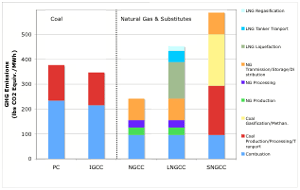Liquid Natural Gas -- A Specious Climate Solution ?
Posted by Big Gav in australia, lng, natural gas, natural gas pipelines
TOD ANZ has a post pondering the pros and cons of LNG vs gas pipelines for exporting Australian natural gas - Liquid Natural Gas -- A Specious Climate Solution?.
Nearly US$80 billion of investment is slated for developing liquid natural gas (LNG) projects in Australia and the Timor Sea. More are planned for Southeast Asia.
The good news is that these LNG developments are aimed are replacing dirty coal-fired power in Japan, China and South Korea with a cleaner fuel: natural gas.
The bad news is that LNG's environmental benefits are potentially so illusory that Asia might be better served by a common carrier natural gas pipeline.
LNG is natural gas compressed 600 times. It is then shipped in pressurised ocean-going tankers. This front-end compression process burns up roughly 10% of the original energy. The pressurised tankers then draw off more energy for each day at sea. At the far end, regasification consumes even more energy
The cumulative losses are so great that LNG-based natural gas supplies may not be much better than coal as a future energy source, according to researchers at Carnegie Mellon University in the United States.
Worse, shipping LNG requires huge investment in expensive, inflexible, single-purpose infrastructure. It's a recipe for long-term financial waste.
With nearly a dozen LNG trains slated for development in Australia's Northwest Shelf, northern Queensland, the Timor Sea and Papua New Guinea, this infrastructure could take Asia's climate change battle backwards for decades to come.
Given the huge volumes of gas now involved in this burgeoning trade (nearly 60 billion cubic meters per year), a pipeline connecting Australia to China, Japan and South Korea may be a better deal.
Instead of insular, 'go-it-alone' buyer-seller LNG microeconomics, a common-carrier pipeline would enhance competition, lower prices and encourage development of smaller natural gas fields through increasing confidence in downstream market access.
Better yet, a pipeline could carry future fuels like hydrogen. LNG trains, tankers and regasification plants simply don't have this flexibility. They risk becoming 'stranded assets' if future carbon pricing exposes their financial shortcomings.
If the LNG industry gets entrenched, it could doom Asia to a generation of suboptimal infrastructure. This, at at a time when trillions of dollars must be spent to battle climate change. Getting poor value for investment dollars is a bad way to fight global warming.






